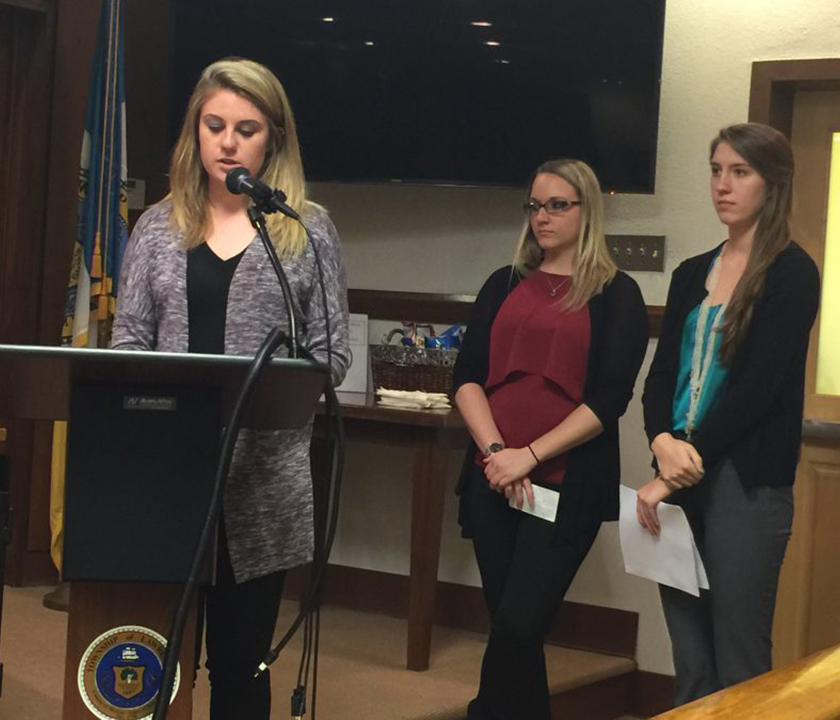Wednesday, Apr 12, 2017
Students partner with sustainability organizations for capstone course
by Robert Leitner ’17
As part of their spring 2016 capstone course, eight Rider students teamed up with the Lawrence Green Team and other local sustainability-based organizations in a successful effort to earn Lawrence Township a silver Sustainable Jersey certification.
Prior to the students’ participation, Lawrence Township had received four bronze level certifications from Sustainable Jersey, a nonprofit that largely supports municipalities in their sustainability programs. The organization tracks sustainability efforts through a points system. The now silver-certified Lawrence Township exceeded the minimum requirement of 350 points and fulfilled 35 actions in 11 categories.
“I learned a lot from this experience, about the Sustainable Jersey program itself, how projects take place at the township level, and the reality of juggling community development with full-time work for most of the people involved in creating these initiatives in Lawrence,” says Lexi Reynolds ’17, a sociology major and sustainability and ethics minor.
The capstone seminar for sustainability minors at Rider is usually a campus-based research project. In 2014, the capstone project focused on advocating for Rider’s energy saving Trigen Plant. In 2016, students took a different approach.
“The capstone integrates everything the students have learned in all of their courses,” says Dr. Brook Hunter, an American history professor who also teaches courses in environmental history, in addition to the sustainability capstone the past two semesters. “Sustainable Jersey certification presented a great opportunity for students to apply their knowledge and skills in a real-world setting.”
Among other things, Reynolds helped facilitate the move of Mercer County's existing Green Fair to Rider, completing one of Sustainable Jersey's requirements is to host a green fair in the township. She's grateful for the overall experience.
“These kinds of projects outside of the classroom are really what made the sustainability studies program invaluable to my college experience, and I encourage others to get involved with opportunities like this during their time at Rider,” she says.
Concentrating on the interdependence of natural, economic and human systems, Rider's sustainability studies minor helps students explore the complex task of protecting the earth while generating economic welfare and ensuring social justice. The program draws on a network of approaches (social, scientific, practical), equipping students to take on increasingly pressing challenges in a wide range of areas, including education, energy, communications, design and ecosystems management
Former Lawrence Township mayor Pam Mount, who is now involved with the township’s Sustainable Jersey recertification, agreed to help get the project approved.
To start, students had to research sustainability efforts in Lawrence, as well as what other townships had done to receive silver certifications. Next, students worked to document actions taken by Lawrence Township.
It was an enormous amount of work, Hunter explains, and one of the things students noted when reviewing other townships was how many had full-time staff devoted to sustainability efforts. Students in the seminar class had to create reports on the actions taken by Lawrence Township to prove they were completed.
“I think one of the most valuable learning experiences for them was the process of trying to collect this evidence and navigating roadblocks," Hunter says. "The requirements make it look easy, but the process was more difficult.”
In addition to regular classroom meetings, where Hunter guided students through the project, students attended town hall meetings, met with various other sustainability groups and went into the community to document actions.
“My favorite part of the experience was being able to get involved with the local community,” says Reynolds. “Attending the Living Local Expo with my class, I got to see how the event came together, and with the class survey, I was able to understand how attendees were gaining great information and ideas from the program.”
Once the sustainability requirements were completed, students wrote their final report for Lawrence Township. This included a comparative chart of previous to current actions and a SWOT (strengths, weaknesses, opportunities and threats) analysis for sustainability in the township.
To help with future certifications, students created a plan of action over a three-year period. The plan explained what actions needed to be done for each upcoming year to maintain silver certification.
“These kinds of projects, where Rider partners with local communities and works to better the lives of students and citizens, are important,” Hunter says. “It shows that Rider is not separate from the community but a valued and contributing member of the community.”
This real-life project gave students an idea of what it would be like to work in the field of sustainability post-graduation.
“I was fortunate to be involved with this project, having learned so much from it and also being able to have this kind of experience on my resume,” Reynolds says. “The most challenging part was simply time management, but that helped me get a better idea of what it's like to be involved in the community and lead environmental projects. Overall, it was a very rewarding experience.”

